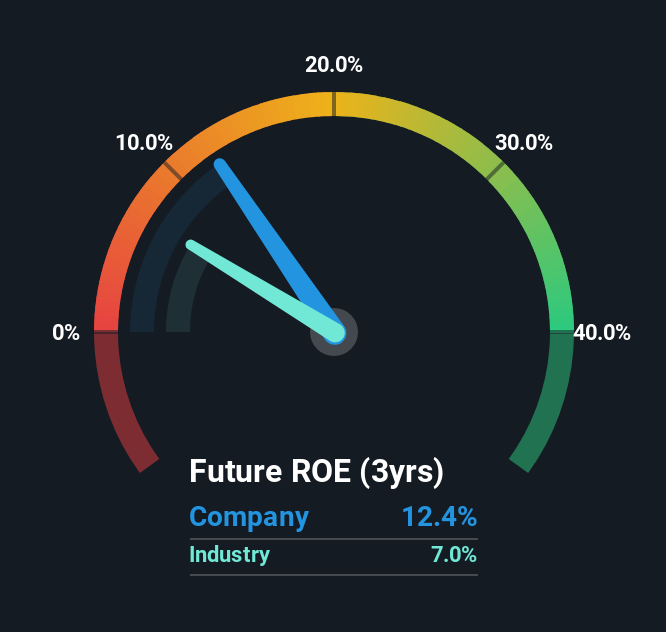- Hong Kong
- /
- Renewable Energy
- /
- SEHK:1811
Should You Be Excited About CGN New Energy Holdings Co., Ltd.'s (HKG:1811) 12% Return On Equity?
Many investors are still learning about the various metrics that can be useful when analysing a stock. This article is for those who would like to learn about Return On Equity (ROE). To keep the lesson grounded in practicality, we'll use ROE to better understand CGN New Energy Holdings Co., Ltd. (HKG:1811).
Return on equity or ROE is a key measure used to assess how efficiently a company's management is utilizing the company's capital. Simply put, it is used to assess the profitability of a company in relation to its equity capital.
How To Calculate Return On Equity?
The formula for return on equity is:
Return on Equity = Net Profit (from continuing operations) ÷ Shareholders' Equity
So, based on the above formula, the ROE for CGN New Energy Holdings is:
12% = US$236m ÷ US$1.9b (Based on the trailing twelve months to June 2025).
The 'return' is the yearly profit. One way to conceptualize this is that for each HK$1 of shareholders' capital it has, the company made HK$0.12 in profit.
Check out our latest analysis for CGN New Energy Holdings
Does CGN New Energy Holdings Have A Good ROE?
One simple way to determine if a company has a good return on equity is to compare it to the average for its industry. Importantly, this is far from a perfect measure, because companies differ significantly within the same industry classification. As is clear from the image below, CGN New Energy Holdings has a better ROE than the average (7.0%) in the Renewable Energy industry.

That's what we like to see. Bear in mind, a high ROE doesn't always mean superior financial performance. Especially when a firm uses high levels of debt to finance its debt which may boost its ROE but the high leverage puts the company at risk. Our risks dashboardshould have the 2 risks we have identified for CGN New Energy Holdings.
Why You Should Consider Debt When Looking At ROE
Companies usually need to invest money to grow their profits. That cash can come from issuing shares, retained earnings, or debt. In the first and second cases, the ROE will reflect this use of cash for investment in the business. In the latter case, the debt required for growth will boost returns, but will not impact the shareholders' equity. Thus the use of debt can improve ROE, albeit along with extra risk in the case of stormy weather, metaphorically speaking.
CGN New Energy Holdings' Debt And Its 12% ROE
It seems that CGN New Energy Holdings uses a huge volume of debt to fund the business, since it has an extremely high debt to equity ratio of 3.45. Most investors would need a low share price to be interested in a company with low ROE and high debt to equity.
Conclusion
Return on equity is one way we can compare its business quality of different companies. In our books, the highest quality companies have high return on equity, despite low debt. If two companies have around the same level of debt to equity, and one has a higher ROE, I'd generally prefer the one with higher ROE.
But when a business is high quality, the market often bids it up to a price that reflects this. Profit growth rates, versus the expectations reflected in the price of the stock, are a particularly important to consider. So you might want to check this FREE visualization of analyst forecasts for the company.
But note: CGN New Energy Holdings may not be the best stock to buy. So take a peek at this free list of interesting companies with high ROE and low debt.
New: AI Stock Screener & Alerts
Our new AI Stock Screener scans the market every day to uncover opportunities.
• Dividend Powerhouses (3%+ Yield)
• Undervalued Small Caps with Insider Buying
• High growth Tech and AI Companies
Or build your own from over 50 metrics.
Have feedback on this article? Concerned about the content? Get in touch with us directly. Alternatively, email editorial-team (at) simplywallst.com.
This article by Simply Wall St is general in nature. We provide commentary based on historical data and analyst forecasts only using an unbiased methodology and our articles are not intended to be financial advice. It does not constitute a recommendation to buy or sell any stock, and does not take account of your objectives, or your financial situation. We aim to bring you long-term focused analysis driven by fundamental data. Note that our analysis may not factor in the latest price-sensitive company announcements or qualitative material. Simply Wall St has no position in any stocks mentioned.
About SEHK:1811
CGN New Energy Holdings
Generates and supplies electricity and steam in the People’s Republic of China and Republic of Korea.
Fair value second-rate dividend payer.
Market Insights
Community Narratives



